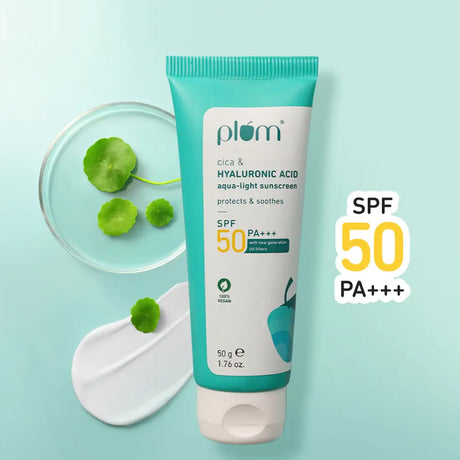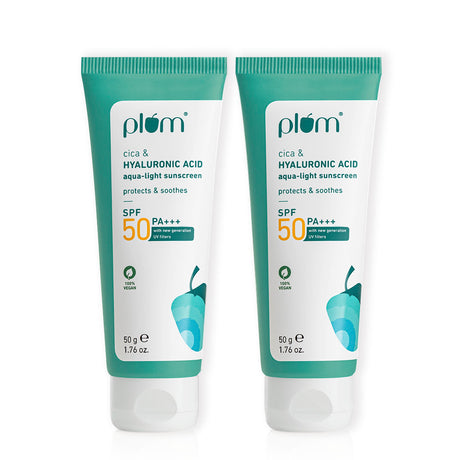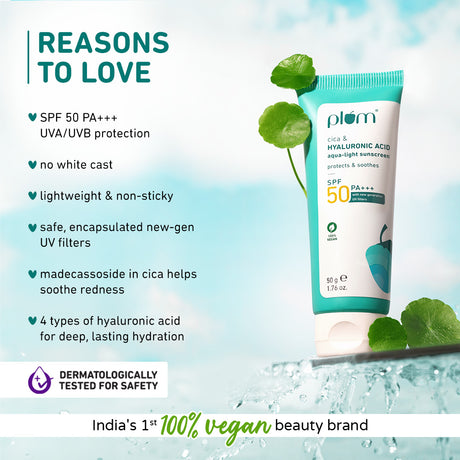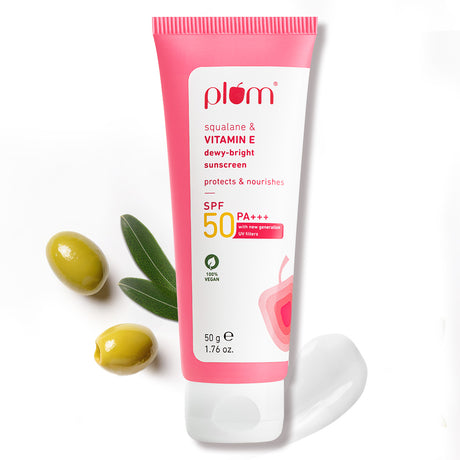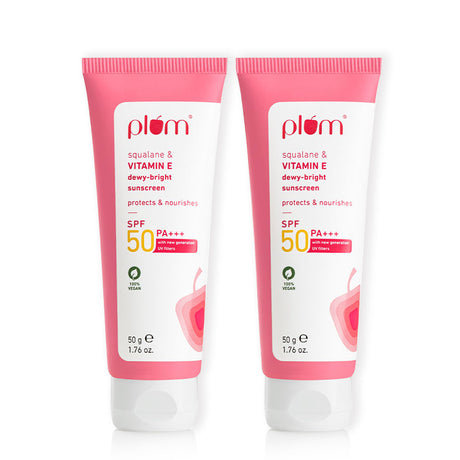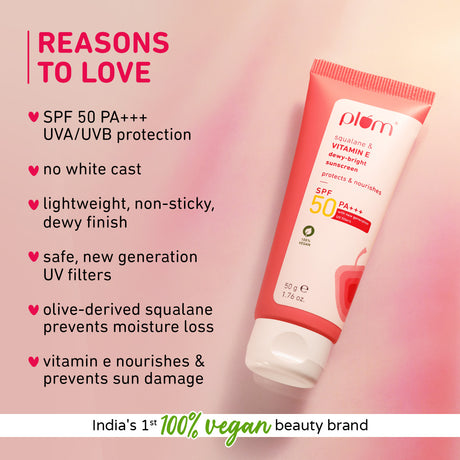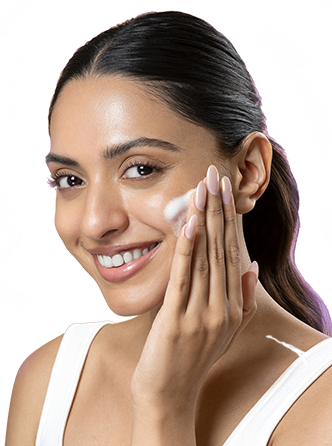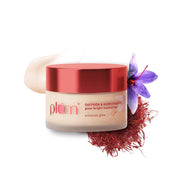
IN THIS ARTICLE
Sure, you know the importance of applying sunscreen every day. However, you might agree that purchasing sunscreen is not taking-a-trip-to-supermarket easy anymore. The presence of different ingredients, filters, and categories can make your mind spin, leaving you in a pool of confusion.
But not anymore! If you have had trouble buying sun defense creams due to their complicated labels, we are here to help you. Get ready to get answers to some of the most commonly asked questions about sunscreens, like, what is SPF in sunscreen, what is PA in sunscreen, what are new-gen filters, etc., that can help you make the right choice.
Let’s decode what each of these mean. But first, let’s understand why we need protection?
Terms about sunscreen you must know
Meaning of UV Radiation
UV or ultraviolet radiation is a type of radiation emitted from the sun that can cause damage to human skin, leading to sunburn, hyperpigmentation, and premature aging. Excessive exposure to UV radiation can damage the DNA in your cells, causing severe skin issues. Experts advise using sunscreen cream (sunscreen for the face) and sunscreen lotion regularly before being exposed to the sun to prevent skin damage. UV rays have two forms- UVA and UVB.
UVA:
UVA are long-wavelength rays that can penetrate deep into human skin and cause long-term damage such as premature aging (wrinkling and drying up) of the skin. They can also cause serious skin problems like cancer. You must use a sun defense cream with PA protection to protect your skin against UVA rays.
UVB:
UVB are short-wavelength sun rays that can damage your skin externally. They typically do not penetrate deep into the skin but are harmful enough to cause immediate damage like darkening of the skin, tanning, hyperpigmentation, and sunburn.
What is SPF in sunscreen?
SPF stands for "sun protection factor". SPFs are the most important factor in a sun cream. SPF determines the amount of protection a sunscreen can provide against UVB rays. The higher the SPF, the greater the protection, and hence, from tanning and sunburn.
However, the amount of UV protection offered is not in direct proportion - i.e., SPF 50 is not twice as strong as SPF 25. SPF35 blocks approximately 97% of UVB rays and SPF 50 blocks approximately 98% of UVB rays. Therefore, experts advise that you should use sunscreen with at least an SPF of 35.
Experts recommend that if you plan to stay indoors for the majority of the day, you can opt for a low SPF range (35 to 45). However, if you stay out for a longer duration and are exposed to sunlight directly or through window panes every day, opt for a higher SPF (50 or above). Lastly, if you are looking for an oily skin sunscreen or have an extremely acne-prone or oily skin sunscreen, an SPF 35 & above might be more suitable for you.
What is PA in a sunscreen?
PA stands for ‘protection grade of UVA’, an index that determines how capable your sunscreen is in protecting your skin against UVA rays. The higher the PA value of a sunscreen, the greater the protection. A higher number of '+' signs means a higher protection against UVA rays. E.g. sunscreen with PA+++ offers higher UVA protection and is better than PA+.
PA value is measured differently in some countries and is known as PPD ("persistent pigment darkening").
What is broad spectrum sunscreen?
Unlike conventional sunscreens that protect only against UVB rays, broad spectrum sunscreens are formulated to protect your skin against UVA and UVB rays. While you purchase a new sunscreen, ensure that it mentions broad spectrum in the labels.
Is there any difference between SPF and PA?
While both SPF and PA help prevent sun damage, knowing the difference between both will help you choose the best sunscreen for your face. While both factors determine the potency and efficacy of your sun defense cream, they are slightly different. SPF protects your skin against UVB rays, whereas PA protects against UVA rays. While picking the best sunscreen for your skin, look for a product that contains both.
What are sunscreen filters?
Sunscreen filters are the main ingredients of sunscreen that protect your skin from UV rays. Chemical filters work by absorbing UV rays and contain ingredients like oxybenzone and avobenzone.
On the other hand physical filters form a protective layer on your skin, preventing them from entering your skin. These physical filters contain ingredients like zinc oxide and titanium oxide.
Depending on these filters, there are three main types of sunscreens: chemical, physical, and hybrid. Hybrid contains both physical and chemical filters providing complete sun protection.
What are new-gen filters?
New-gen filters are the latest & safest sunscreen filters that keep the sunscreen stable and ensure lasting UVA/UVB protection. They are also less likely to cause skin irritation.
The Cica & Hyaluronic Acid SPF 50 PA+++ Sunscreen and
Squalane & Vitamin E SPF 50 PA+++ Dewy-Bright Sunscreen contain the new-gen filters, providing better sun protection.
Which one should you choose?
Chemical and hybrid sunscreens are typically lightweight and easier to apply and hence, suitable for oily and combination skin. On the other hand, physical sunscreens tend to be thicker and moisturizing and hence better for people looking for sunscreen for dry skin.
Moreover, encapsulated filters enable a lightweight and non-greasy texture and are especially desirable in sunscreen for oily skin.
Our suggestions for different SPF
SPF 50
SPF 35
Takeaway
Now that you are armed with all the information related to sunscreens, like spf meaning and more, read the labels carefully before buying one. Make sure your sunscreen has SPF and PA (or PPD) and is broad-spectrum. And of course, use them daily!
FAQs
Q.1 What is a good SPF level for sunscreen?
If you stay indoors the entire day without any exposure to sunlight, you can use an SPF of 35 for your skin. However, for everyday use and longer exposure to sunlight, you must opt for sunscreen with an SPF of 50 or more.
Q.2. What does +++ mean in SPF?
The PA +++ sign is used to indicate the efficacy and competency of your sunscreen SPF to protect your skin against UVB rays. The higher the +++, the better for your skin.
Q.3 Which SPF sunscreen is the best?
An SPF sunscreen that has broad-spectrum and new-gen filters is best for your skin. It should be lightweight, non-greasy, and leave no white cast. Moreover, it should have a minimum SPF of 35 with PA +++ filters.
Q.4 What happens if I use SPF 50 every day?
Using sunscreen SPF 50 every day can ensure your skin is well protected against sun damage. You can witness a reduction in the appearance of dark spots and tanning with its consistent usage. Sunscreen SPF 50 will also prevent your skin from skin issues like tanning, dark spots, and sunburn.



